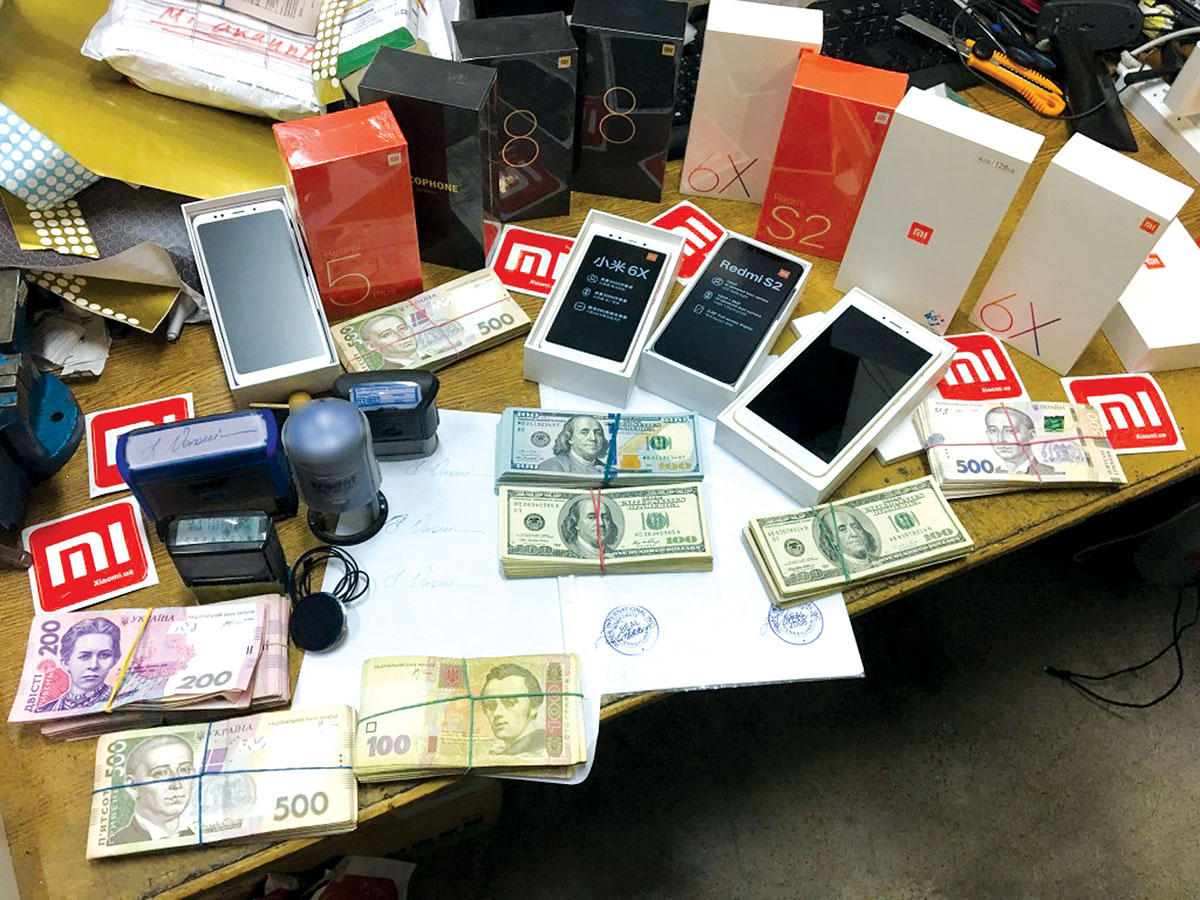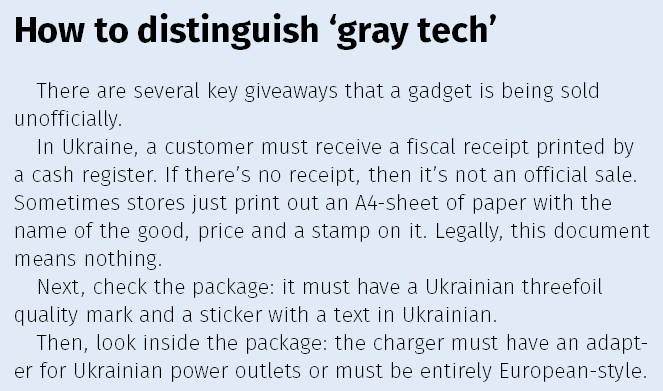When Galya Rudyk bought a brand new laptop from a top Ukrainian retailer, she got an unexpected surprise.
The new device, purchased for her workplace, looked like someone had already used it. It had a big scratch on top, and, when she booted it up, she found proof it was far from new: gigabytes of someone else’s files.
Rudyk was in a better position than most. As a producer at Slidstvo.Info, a Ukrainian investigative journalism outfit, she had much more leverage when demanding that the store make amends.
“They understood that I won’t leave them alone, that I’m not a stupid user,” she said.
Ultimately, the store replaced the laptop with a truly new one and promised not to resell the used laptop as new.
But as odd as Rudyk’s experience was, it was far from unique in Ukraine. Every year, countless people fall victim to retailers who sell so-called “gray tech” — devices unlicensed for sale in Ukraine.
No one is entirely open about the practice. Some retailers make it more or less clear and largely sell to customers who understand “gray tech” as a chance to save money. But many simply violate their clients’ trust in a mad dash to earn more money.
It is unclear how many people accidentally purchase “gray” gadgets each year in Ukraine. However, the volume of shady imports is immense: 50–70 percent of all the devices sold in the country are brought here unofficially and go untaxed, according to European Business Association Ukraine.
This figure could be even bigger because “it’s difficult to evaluate precisely,” as such retailers “obviously don’t declare their activity” with the fiscal service, Viktoriia Kulykova, the association’s consumer electronics committee manager, told the Kyiv Post.
And while dishonest retailers trick many individual customers, their biggest victim may be Ukraine’s state budget.
No taxes — no guarantees
The best way to earn more money is to spend less. And, in Ukraine, the best way to spend less is often to avoid paying taxes. That is just what many retailers do when importing electronics — even though they often tell customers that these devices are completely legal.
Ukraine loses $370 million a year due to retailers evading taxes, according to the EBA.
After a retailer illegally imports tech, it cannot print fiscal receipts for the products, offering instead a printed document with the good’s price and the store’s official stamp.
But without a true fiscal receipt it is almost impossible to claim the money back. According to field experiments by the EBA, there’s a 50-percent chance that the customer will not be able to return the purchased gadget.
No receipt also means no warranty. That document is particularly important for sophisticated electronics — mobile phones, laptops, tablets, and computers — which often break.
But even if “gray” retailers provide customers with in-house warranties and fix devices using their own service centers — a common practice — companies like Apple will not accept gadgets that have been previously fixed by third parties for an official repair afterwards.
And there is one other important — albeit less common — risk from gray technology. Devices purchased abroad and brought to Ukraine unofficially often do not meet Ukrainian electrical or safety standards. They often have different power plugs and need adapters, which can be of poor quality.
Different countries’ electrical outlets use different power currents. In America, for example, outlets have a 110-volt current, while Ukraine uses 220 volts. A device designed for the U.S. could overheat, catch fire, or even explode when plugged into a Ukrainian outlet.
While searching for gadgets using websites like Hotline, which aggregate offers from online stores and show them in one place, Kulykova and her colleagues at the EBA counted that two devices out of three “have never been certified to work in Ukraine.”
“They were never tested in Ukraine and it’s unknown if it’s safe to use them here,” she said.
Not always a low price
Despite these risks, many Ukrainians are happy to buy “gray tech,” ensuring its continued demand in the country. The reason is straightforward: it is sometimes 40 percent cheaper than legally imported electronics.
But that is not always the case. Big name stores like Citrus, where Galya Rudyk purchased the not-really-new laptop, have been known to sell untaxed gadgets for the same price as taxed ones.
Citrus, which has frequently faced accusations of selling “gray tech,” declined to comment for this story. Several retailers like Macroom and Ringoo, who are more upfront about the origins of their goods and who tend to sell at a low price, also declined to comment.
Such sales are a simple way for stores to increase their margins. Meanwhile, the risks of the scheme — an un-warrantied device not designed for the Ukrainian market — fall entirely on the unaware customer, who does not even get a discount.
Illegal schemes
Keeping “gray tech” out of the country has proven a challenge. Law enforcement is indeed fighting these illegal imports and making arrests, Kulykova said. But the problem is simply too big, she added.
Meanwhile, the phones, tablets, and laptops are small and easy to smuggle. Every day, thousands of people bring their own devices in and out of Ukraine for completely legitimate, non-commercial purposes. Some travelers coming from abroad bring devices as gifts for their friends and relatives.
How can law enforcement distinguish between legitimate transportation of these devices and illegal imports?
According to the Ukrainian law, a person travelling abroad can bring two phones and two laptops into Ukraine tax-free, provided that the devices are for personal use. But nobody checks whether these people sell the gadgets after passing through customs.
Kulykova thinks dishonest retailers bring untaxed items both individually and in large batches. However, the latter case may involve corruption, she admits.
According to Kulykova, each time an expensive device like a large television is shipped into Ukraine officially, the TV set’s developer receives a notification about the shipment. But the EBA found such TVs for sale in Ukraine and checked with their developers, who confirmed that they are gray.
“It means somebody is slipping them past the border gate,” she said.
However, Evgeniy Plinskiy, a journalist from the 1+1 television channel, claims he knows exactly how it happens: large expensive tech is being carried across the border by so-called “shuttles.” Six people get in a bus and, when they cross the border, they claim they bought devices abroad and are taking them to Ukraine for personal use. Each receives $10 per item.
But the most popular way to bring goods to Ukraine unofficially is by post, according to Plinskiy, who has carried out many independent investigations of the matter.
A fictitious company orders boxes full of gadgets to be shipped to Poland. Then, people associated with the company ship them to Ukraine using delivery companies.
The delivery companies show Ukrainian and Polish border-guards different documents. Poles see documents presenting the parcels as they actually are, but they don’t tax them because they are only transiting through the country. Ukrainians are shown documents stating that the parcels are deliveries to different people, valued at some $30 each, Plinskiy said.

The police intercepted parcels with untaxed electronics worth $250 million in December 2018 in Kyiv. This is just one example of law enforcement confiscating goods that are brought into Ukraine illegally. (kyiv.sfs.gov.ua)
Another common scheme is when individuals claim Ukraine is a transit country and they are travelling farther, but ultimately the goods stay in the country.
Official distributors, meanwhile, must pay a 10-percent tax on the value of a good surpassing 1,000 euros if shipped by air (and 500 euros if by car) plus 20 percent of the total price of a device. So those who do business honestly and pay all their taxes and customs charges lose money in an unfair rivalry.
Plinskiy thinks the problem is not only the “border full of holes,” but the absence of punishment for selling goods without receipts, which has been unlawful since May 2017. The penalty for violating that law is just 3 cents per sale.
“Nobody is afraid of that,” Plinskiy said.
Bad image
Kulykova believes that retailers who sell “gray” goods harm everyone: the state, consumers, and other businesses. And that’s not exclusively about electronics — it’s also about clothes, alcohol, household chemicals, and so on.
“They all find some loopholes. We’ve got a big shadow economy in Ukraine,” Kulykova said, adding that such activity tarnishes Ukraine’s reputation, making it less attractive to investors. “Nobody would want to open official sales points here, let alone open factories here.”
But the bigger issue may be that secretly selling “gray tech” doesn’t hurt retailers’ reputations enough and the country’s economic realities continue to make such sales profitable.
Despite her experience with buying a laptop from Citrus, Rudyk says she is not ready to write off the store entirely. She knows another retailer where she prefers to buy tech and trusts the information she is provided. But if the price is lower at Citrus, she will consider making the purchase there. But she will be more cautious and be sure to check the gadget before leaving the store, she said.
“This experience taught me that you can’t simply believe them when they tell you the tech is new.”

The Kyiv Post’s technology coverage is sponsored by Ciklum and NIX Solutions. The content is independent of the donors.
